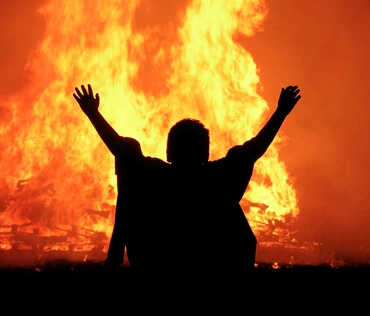Fire

Fire, in the spiritual sense, can mean either love or hatred depending on the context, just as natural fire can be either comforting in keeping you warm, or scary in burning down your house. Our language reflects this, too -- we use concepts like a smoldering hatred or a burning love. So fire signifies a love, either a good love of the neighbor and to the Lord, or, in a bad sense, selfish love of oneself that, if unchecked by conscience, leads to hatred of anyone that opposes it.
Today
In Genesis 19:37; 21:26; 30:32; 40:7; Matthew 6:30; Luke 12:28, this signifies the perpetuity and eternity of a state. (Arcana Coelestia 2838)
In Psalm 2:7, this signifies in time; for with Jehovah the future is present. (True Christian Religion 101)
The expression 'even to this day' or 'today' sometimes appears in the Word, as in Genesis 19:37-38, 22:14, 26:33, 32:32, 35:20, and 47:26. In a historical sense, these expressions have respect to the time when Moses lived, but in an internal sense, 'this day' and 'today' signify the perpetuity and eternity of a state. 'Day' denotes state, and likewise 'today,' which is the current time. Anything related to time in the world is eternal in heaven, and to represent this, 'today' or 'to this day' is added. Although, in the historical sense, this appears as if the expressions only have a literal meaning, just like it says in other parts of the Word, such as Joshua 4:9, 6:25, 7:20, Judges 1:21, 26, etc. 'Today' means something perpetual and eternal in Psalms 2:7, 119:89-91, Jeremiah 1:5, 10, 18, Deuteronomy 29:9-14, Numbers 28:3, 23, Daniel 8:13, 11:31, 12:11, Exodus 16:4, 19, 20, 23, John 6:31, 32, 49, 50, 58, Matthew 6:11, and Luke 11:3.
(Odkazy: Arcana Coelestia 2838 [1-4], Genesis 47:26)






